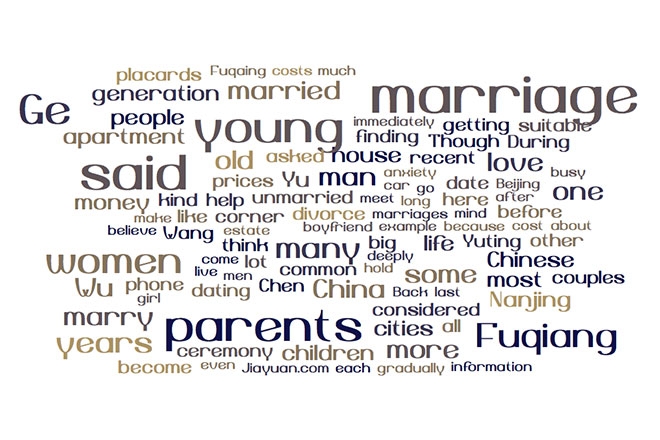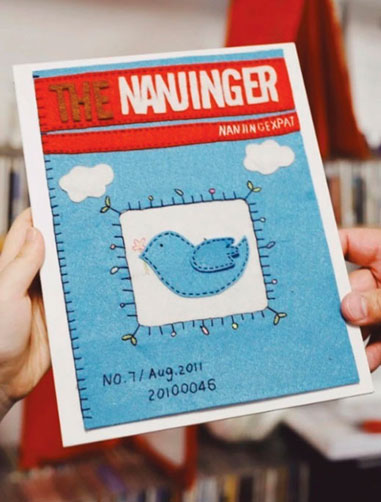On weekends in the XuanWu Lake Park in Nanjing, Chinese parents hang placards as helper of finding suitable spouses for their unmarried children. Most of the advertisements center around salary, car and apartment. This kind of match-making corner is very common in China. On a recent weekend, a 27-year-old man named Ge Fuqiang showed up and was crowded by these parents who asked many and varied questions.
“The most frequent question I was asked was my salary,” said Ge Fuqiang. During the three hours he spent wandering in the park, he was asked a lot of questions but no one took down his phone number. “Maybe it’s because I’m poor,” Ge Fuqiang said.
“My dream is to have a date with a nice girl, who doesn’t mind money so much and I would strive through all the difficulties to provide her a comfortable life,” Ge Fuqiang said.
In China, the relationship between love and money get gradually bound more tightly than ever. Back during the Maoist era in the 1970s, what was considered important for a marriage were four functional status symbols: bicycles, watches, sewing machines, radios, or sometimes what was known as “30 feet”—one bed, one desk and several chairs. In recent years, houses have become a necessity and often dominated the question of whether to marry.
A survey conducted by Jiayuan.com in 2014 showed that 55% of men and 62% of women said that they considered wealth as success of a person, and more than 30% of women said that they considered possession of a house a prerequisite for a man to get married.
Such concerns are weigh on many young Chinese men, who have been squeezed by skyrocketing real estate prices and the traditional culture.
Chen Yicheng, a 25 years old young man bought a 70-square-meter house in Beijing last year, which cost his family 1.63 million yuan, including an initial payment of 800,000 yuan supported by his parents. And the rest mortgage payment will be paid to bank over 30 years.
“I think that offering an apartment is responsibility for a man to marry a woman, and it has gradually become the society’s common sense .” Chen said. However, most of the young people are not as lucky as Chen, and can’t afford to buy an apartment, even with the help of parents’ savings. From 2009, house prices in China’s first-tier cities such as Beijing and Shanghai are riding the crest of a rising wave. Many young couples have to postpone marriage date or forced to leave big cities.
Under the big pressure of the soaring real estate prices and the increasing costs of living in the big cities, there is also a trend for many young couples to opt for “naked” marriages — tying the knot before buying a house and a car or even holding a ceremony.
Wu Yu is a girl getting married immediately after graduating from SouthWest University Of Political Science & Law last year and hold a traditional wedding ceremony in her hometown Deyang, Sichuan province. Though the wedding was simple, Wu Yu doesn’t think that it will affect her marriage. The couple went to Nanjing for work immediately after the ceremony and moved into a rented apartment.
“It’s unfair to ask a young man your age to own a lot of money. I believe that as long as we are working hard and love each other deeply, we’ll live a happy life,” Wu says.
Wu Yu believes naked marriages benefit society. “It teaches young people the core spirit of marriage –love each other deeply, whether they are rich or poor,” Wu Yu says, she added that some newlyweds save marriage costs for other expenses such as their children’s education, traveling or charity.
Though the large cost of marriage might do, many couples don’t cherish their marriage as the promises they made in the weeding. In recent years, the divorce rate has gone up steadily, and the post-1980s generation possess the highest rate of divorce percentage. Sometimes the reason for divorcing is stunning. For example, some women filing for divorce are complaining that their husbands spend too long playing video games according to the China Daily’s reports.
Compared with the older generation, young Chinese seem to hold more diverse value when it comes to marriage. Some people don’t think getting married and raising children is an essential part of life, others say yes to love but no to marriage. But most of them will face pressure from the parents’ generation and the society to them.
In china, women who are not getting married before 27 often be tagged as the “leftover” women. Wang Yuting, who is one of them, is 28-year-old and now working as a PR in a company in Nanjing. Bombarded with eager inquiries from her parents and relatives about when she would have a boyfriend, Spring Festival has become something of a nightmare for her. “I would rather be single than marry a guy who is not the Mr.right in my mind. I could live a good life all by myself,” Wang Yuting said.
Like Wang Yuting, more women are voluntarily making the decision not to get married as soon as others want them to. As women do not necessarily have to rely on their spouse to support them anymore, marriage is no longer a necessity to survive, and as such some women choose to wait or totally dispense with it all together.
To pursue an advanced study or a better career, many young Chinese are busy and bustled in cities, causing them lacking the opportunities to meet new people or choosing to marry later. If the child doesn’t find a suitable candidate to marry before 27 years old, it would make the parents anxious a lot.
Parents’ worried attitude towards their unmarried offspring is kind of typical anxiety starting from when their baby is born. From attending tutorial classes to applying for universities, they always sort things out and make decisions for their children. This kind of anxiety is extending, now coming into the generation’s marriage.
During these match-making scenes, what is interesting and common to see is that the young generation seldom go to the match-making corner themselves. It’s the mostly grey-haired parents who scrutinize the potential son or daughter-in-law’s profile for compatibility and exchange information about their unmarried children.
“My daughter is 30 years old and she is busy at work and doesn’t have a boyfriend. I come here to see if someone is suitable and I would help to arrange a blind date for them,” One old woman, who didn’t want to tell her name, said. Ge Fuqiang had to go to the match-making corner by himself because his parents were not in Nanjing and they couldn’t help him to do this. “But I felt embarrassed when I took down the girl’s phone numbers and I was afraid of to meet old friends there, it seems a shame to be here,” Ge Fuqiang said. Beyond match-making event, there are many new dating routines though TV, the Internet and mobile phone. For example, dating shows like” If You Are The One”, websites or apps like Jiayuan.com, and some of them are so popular in China.
“I don’t believe the online dating, and it’s reason why I come here tough I’m not willing to,” Ge Fuqiang said. Amid the mob scene at the marriage market, Ge Fuqaing kept going back and forth in front of the placards but didn’t take down much information.
“Finding love through the thousands of personal ads on the placards was more challenging than finding a needle in a haystack,” Ge Fuqaing said and left sounding disappointed.











